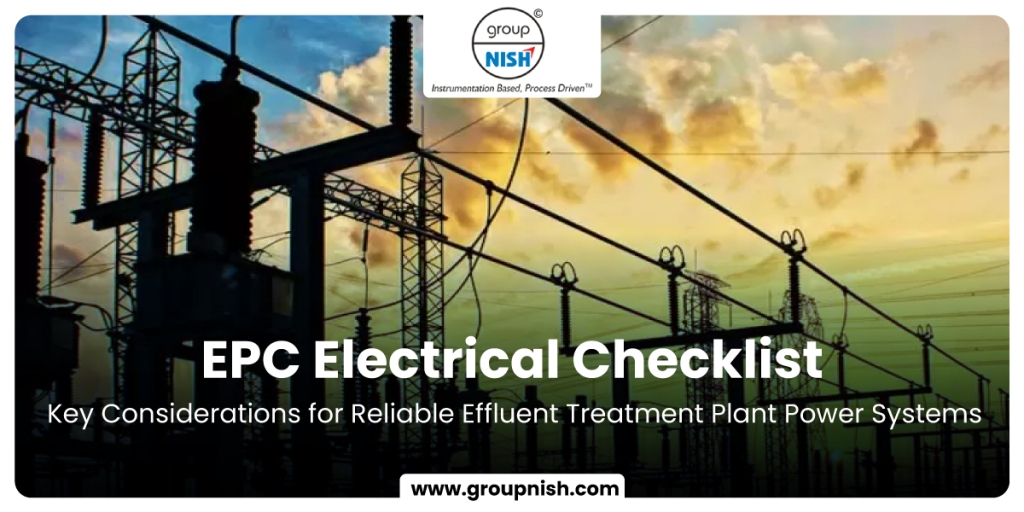Effluent Treatment Plants (ETPs) are of significant importance in the management and treatment of wastewater originating from industrial and municipal sources, with the primary objective of ensuring compliance with environmental regulations prior to its discharge. The effectiveness of an Energy Transfer Platform (ETP) is contingent upon the presence of a resilient and dependable power infrastructure. The Engineering, Procurement, and Construction (EPC) phase plays a crucial role in establishing a solid groundwork for an effective electrical infrastructure inside an Energy Transition Project (ETP). Experience the power of seamless batch automation. Collaborate with Group Nish, a trusted service provider of Automation system integration for batch processes in Rajasthan, and let’s shape the future of your batch processes.

The purpose of this blog is to provide insight into the crucial factors to be taken into account regarding the electrical aspects in the Engineering, Procurement, and Construction (EPC) phase, with a specific focus on their significance in ensuring a reliable power supply for an effluent treatment plant.
● Load Assessment and Analysis:
The initial step involves comprehending the power demands of the ETP. Conducting a thorough load assessment and analysis is crucial in order to ascertain the power requirements at different phases of the treatment process. This entails the evaluation of pumps, blowers, mixers, and other essential machinery. Ensuring precise load analysis is essential in order to appropriately size the electrical system and effectively manage the expected load.
● Equipment Selection and Specification:
The process of choosing and specifying appropriate electrical equipment is of utmost importance in ensuring the reliability of an ETP power system. The process entails the selection of transformers, switchgear, cables, and other components that are tailored to satisfy the specific requirements of the ETP. In order to achieve the best performance and longevity, it is imperative to specify the equipment based on load requirements, environmental conditions, and compliance with industry standards.
● Compliance with Regulations:
Compliance with both local and international electrical norms and regulations is crucial in the design of an ETP power system. Adherence to these criteria guarantees the preservation of safety, effectiveness, and dependability within the electrical infrastructure. Additionally, it serves to mitigate legal complexities and probable cessation of operations arising from non-adherence concerns.
● Redundancy and Backup Systems:
To ensure the reliability of the power supply for an ETP, it is imperative to incorporate redundancy measures that effectively limit the potential risks associated with power disruptions. These components encompass backup generators, uninterruptible power supply (UPS) systems, and automated transfer switches. The implementation of redundancy measures guarantees the uninterrupted continuation of crucial processes, particularly in instances of power outages.
● Safety Measures:
Ensuring safety is of utmost importance in every electrical system. The implementation of appropriate safety measures, including grounding, lightning protection, and fire prevention systems, is crucial for the protection of workers, equipment, and the environment. The implementation and continuous maintenance of safety standards are crucial for the effective operation of an ETP power system. For precise EPC electrical for the effluent treatment plant in Maharashtra, trust Group Nish, a leading EPC electrical service provider in Maharashtra, for top-tier electrical solutions that enhance efficiency.
● Energy Efficiency and Sustainability:
The integration of energy-efficient technology and practices into the power system of the ETP not only leads to a decrease in operational expenses but also supports the pursuit of sustainability objectives. The implementation of energy-efficient equipment, the utilisation of renewable energy sources, and the optimisation of energy use all play a significant role in fostering a more environmentally friendly and sustainable energy technology platform (ETP).
● Integration of Automation and Control Systems:
The integration of automation and control systems is vital in contemporary ETPs, as it enables the implementation of advanced mechanisms for the efficient and real-time monitoring of power consumption and equipment functionality. The integration of automation technology facilitates improved control, predictive maintenance, and prompt reactions to anticipated difficulties, hence boosting the overall reliability of the ETP power system.
● Proper Cable Routing and Management:
Efficient cable routing and management are necessary in order to mitigate cable damage and maintain optimal performance. The act of effectively arranging and safeguarding cables not only enhances safety measures but also streamlines maintenance and troubleshooting protocols, hence reducing the occurrence of operational interruptions.
● Future Expansion and Scalability:
Efficient cable routing and management are necessary in order to mitigate cable damage and maintain optimal performance. The act of effectively arranging and safeguarding cables not only enhances safety measures but also streamlines maintenance and troubleshooting protocols, hence reducing the occurrence of operational interruptions.
Final Thoughts:
It can be stated that the Engineering, Procurement, and Construction (EPC) phase holds significant importance as the fundamental component of a power system within an effluent treatment plant. By including the aforementioned critical elements during this phase, it guarantees the establishment of an electrical infrastructure that is dependable, effective and adheres to regulations. The efficacy of an ETP is contingent upon the strategic forethought and rigorous planning dedicated to the electrical components, thereby establishing the foundation for a wastewater treatment facility that is both sustainable and environmentally beneficial. Your batch processes deserve the best automation. Trust Group Nish with Automation system integration for batch processes in Rajasthan for high-quality solutions that drive efficiency.